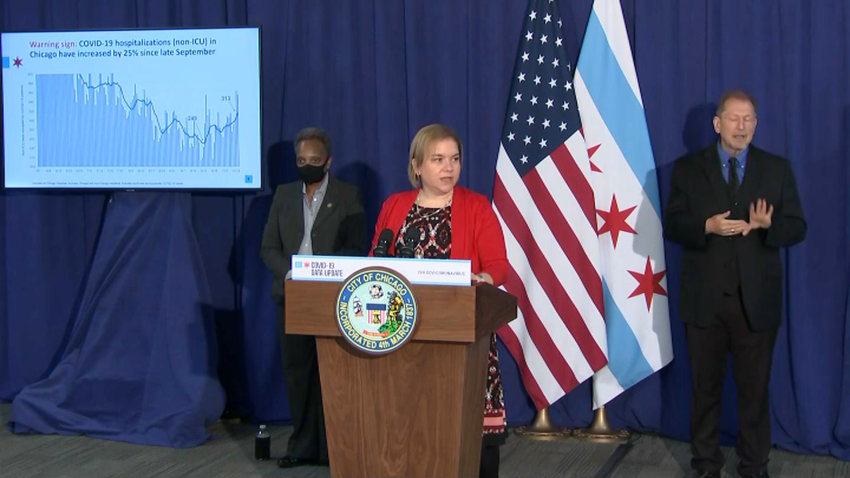Chicago officials issued a "business curfew" on Thursday, requiring non-essential businesses to close at 10 p.m. nightly as part of a new set of regulations put in place as coronavirus metrics continue to rise.
The curfew will apply to non-essential businesses and will be in effect each night from 10 p.m. to 6 a.m. It begins Friday and will last at least two weeks, city officials said.
Essential businesses include, according to the city's stay-at-home order issued at the outset of the pandemic in March:
- Animal Grooming Services
- Emergency City services and other essential government services
- Hospitals, healthcare and public health operations
- Grocery stores, pharmacies, corner stores, and all other stores that sell groceries and medicine
- Laundry services
- Restaurants for consumption off-premises
- Gas stations and businesses needed for transportation, including bike shops
- Greenhouses, Garden Centers and Nurseries
- Transportation, for purposes of Essential Travel
- Financial institutions
- Day care centers
- Hardware and supply stores
- Essential Infrastructure:Working in food production, distribution and sale; construction; building management and maintenance; airport operations; operation and maintenance of utilities, including water, sewer, and gas; electrical; distribution centers; oil and biofuel refining; roads, highways, railroads, and public transportation; ports; cybersecurity operations; flood control; solid waste and recycling collection and removal; and internet, video, and telecommunications systems
- Food, beverage and cannabis production and agriculture
- Organizations that provide charitable and social services
- Media
- Critical trades, including: plumbers, electricians, exterminators, cleaning and janitorial staff for commercial and governmental properties, security staff, operating engineers, HVAC, painting, moving and relocation services, and other service providers that maintain the safety, sanitation and essential operation of residences, Essential Activities, and Essential Businesses and Operations
- Mail, post, shipping, logistics, delivery and pick-up services
- Educational institutions, for purposes of facilitating distance learning, performing critical research, or performing essential functions
- Supplies to work from home
- Supplies for Essential Businesses and Operations
- Home-based care and services
- Residential facilities and shelters
- Religious gatherings are permitted if they are limited to 10 people and adhere to social distancing guidelines
- Professional services
- Manufacture, distribution, and supply chain for critical products and industries
- Critical labor union functions
- Hotels and motels,to the extent used for lodging and delivery or carry-out food services
- Funeral services
Anything else will be required to enforce the curfew.
City officials also again shut down indoor service at bars, breweries and taverns operating without a food license. Indoor dining under previously announced guidelines is allowed to continue and take-out or curbside pick-up is still permitted, authorities say, and last call for serving liquor will be at 9 p.m.
Chicago officials also said Thursday that a maximum of six people are allowed in a gathering of non-household members and face coverings are required in all indoor and outdoor public settings.

Health officials said that in the previous week alone cases had risen by 54% to more than 640 per day, as the positivity rate in testing has also increased to 6.4%. The city has also seen a "worrying increase" in hospitalizations, up 45% in one month.
Under Illinois' coronavirus guidelines, if the city (one of the state's 11 health care regions) reaches an 8% positivity rate for three consecutive days, further mitigations like shutting down indoor dining will be automatically triggered.
“The rapid rise we’re experiencing in COVID-19 cases across all demographics, zip codes and age groups is consistent with what public health experts and responsible leaders have been predicting for months,” Mayor Lori Lightfoot said in a statement announcing the changes.
“This moment is a critical inflection point for Chicago, and these new restrictions and guidelines represent our ongoing effort to stay ahead of this pandemic through the data and science of this disease," she continued. "Countless Chicagoans have done an outstanding job in being responsible and following public health guidance, but now we all must double-down on our commitment to our health and the health of our city in order to bend the curve and shape our future back to where it needs to be.”

